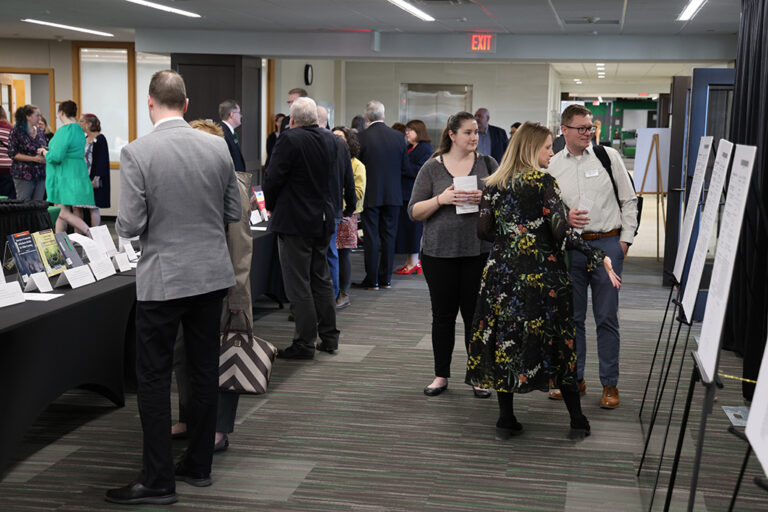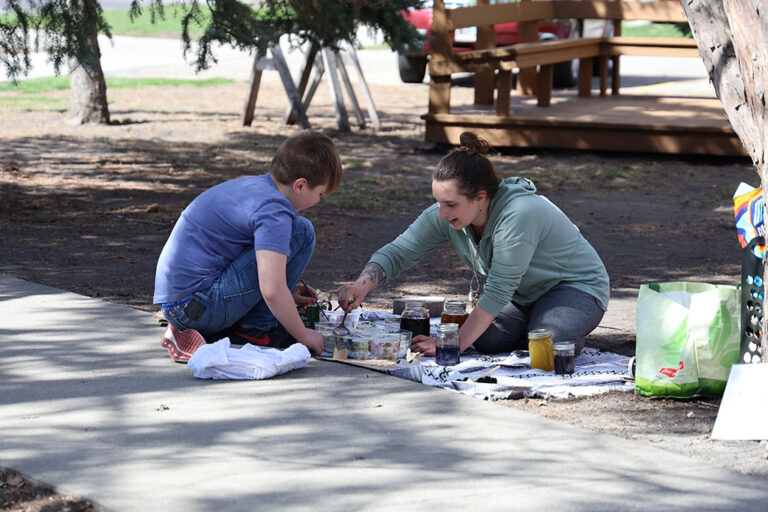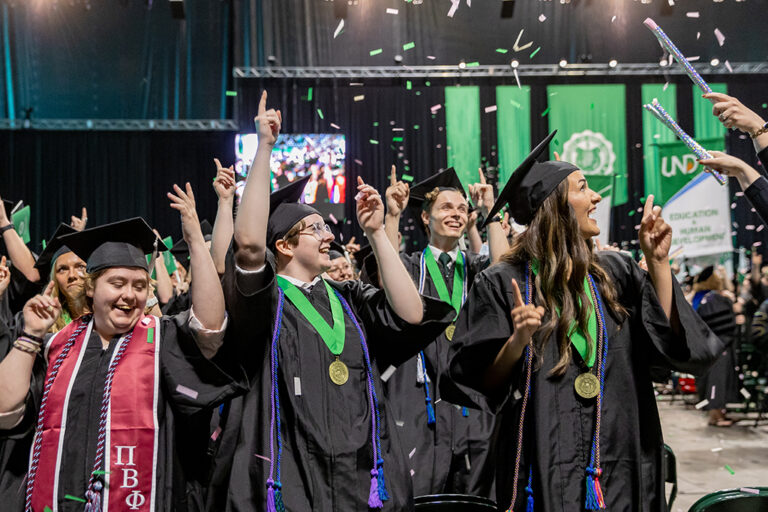Oh, the Humanities!
New Arts & Sciences course explores how writing and analysis skills fit in the modern job market

Natasha Puetz will graduate this month with a UND English degree and a certification in Writing, Editing & Publishing. From there, it’s off to celebrate the holidays with family and friends – and to once again explain what that English diploma really means for her future.
“My town is small and everybody knows each other and takes an interest in us. They always assume I’m going to teach,” the aspiring editor from Wyndmere, N.D., grinned in reflection. “But I can do a lot of things.”
It’s a question that humanities majors face throughout their college careers: What are you going to do with that major? And that’s the question UND Associate Professor of English Yvette Koepke wants to prepare students to answer, whether at a Christmas party or a job interview.
This semester Koepke leads a course called Creative Humanities Outcomes in Career Excellence (CHOICE). The one-credit offering is designed to show humanities majors how their skills make them specially suited for the modern job market, and how they can promote those skills effectively.
The idea grew out of the work being done by Associate Professor of English Chris Nelson to connect English students with internship opportunities in the community, and supports the UND Strategic Plan’s first goal of providing a strong liberal arts foundation.
“[College of Arts & Sciences Dean Debbie Storrs] supported the idea of broadening beyond English and offering it to all humanities majors,” Koepke said, “to help them explore career opportunities that they might not have thought about and be able to present their liberal arts education in as relevant and useful a way as possible.”
The right path
CHOICE’s current enrollees include freshman-senior majors from English, psychology, communication and political science, as well as some who are still undecided. No matter their background, the syllabus is the same – résumé refinement, crafting creative cover letters, and really selling those writing, speaking, and critical thinking skills through mock interviews.
Koepke uses two books to guide class discussion – one that focuses on the nuts and bolts of preparing for the job search, and another based on personal reflection, with which students can map their passions to find a career that embraces both their interests and talents.
“There have been a number of ‘aha’ moments,” Koepke said. “They realized that there was a thread or connection that they wanted to bring into their thinking about future jobs and opportunities, and also what was unique about them.”
The class has helped junior Communication major Brooke Lyberg realize that career uncertainty is common for humanities-based majors. “Before this class I really didn’t have a great idea of what I wanted to do. I love to write, so I thought journalism of some sort,” the Hallock, Minn. native said. “Now I’m starting to nail it down. I love politics, too, so I’ve looked into some political journalism organizations.”
Puetz knew she wanted to enter the world of editing and publishing before she enrolled in CHOICE, but the course has shown her how to pitch her degree in a way that makes her a frontrunner.
“When somebody says they’re an engineering major, people get that – you’re going to be an engineer,” Puetz explained. “Professor Koepke puts it this way – there are no ‘English-ers’ or ‘History-ers’. So we have to learn how to talk about our liberal arts degrees, because they’re actually very valuable.”

Shining examples
Koepke also looks to the community’s UND alumni base to not only create internship connections for her students, but to show out-of-the-box examples of what UND humanities graduates are doing with their skill sets.
SkySkopes CEO and UND alumnus Matt Dunlevy joined the CHOICE discussion as a guest speaker, telling the students his journey began in the very same classroom. After graduating with a History degree, Dunlevy built his UAS startup from nothing – a feat he said would have been difficult without his extensive writing and communication training.
“SkySkopes was the first startup in North Dakota that the Federal Aviation Administration (FAA) allowed, legally, to make a business out of drones,” he told the class. “A humanities background made it much easier to speak the language of UAS regulations. Those skills made the application easier and better timed.”
Beyond his work with SkySkopes, Dunlevy is an advisory board member for UND’s new Research Institute for Autonomous Systems and the co-chair of the Grand Forks Military Affairs Committee. He loves being involved with these community efforts, bringing unique tools to every meeting and project.
“From my studies at UND, I take pride in being able to work with narrative, which is often a fundamental component in leadership,” he said. “I think that humanities definitely lend themselves to building leaders in the community.”
Future forward
As the course continues, Koepke says they will use feedback to fine-tune the course to best serve students’ needs. But the goal remains the same – showing UND’s leaders in action where their strong liberal arts foundation can take them.
“The skills they gained from writing a philosophy paper and analyzing novels … those skills are essential for the workplace,” Koepke said. “And they’re becoming more, not less, essential.”
And until Puetz lands that dream job with a literary powerhouse, she knows how to respond when people ask her about the potential of her degree.
“You can do a lot of things with an English major. English majors are CEOs of Fortune 500 companies, and they’re your managers at Target,” she said. “I don’t have to be a person who has just one job for the rest of my life.”


